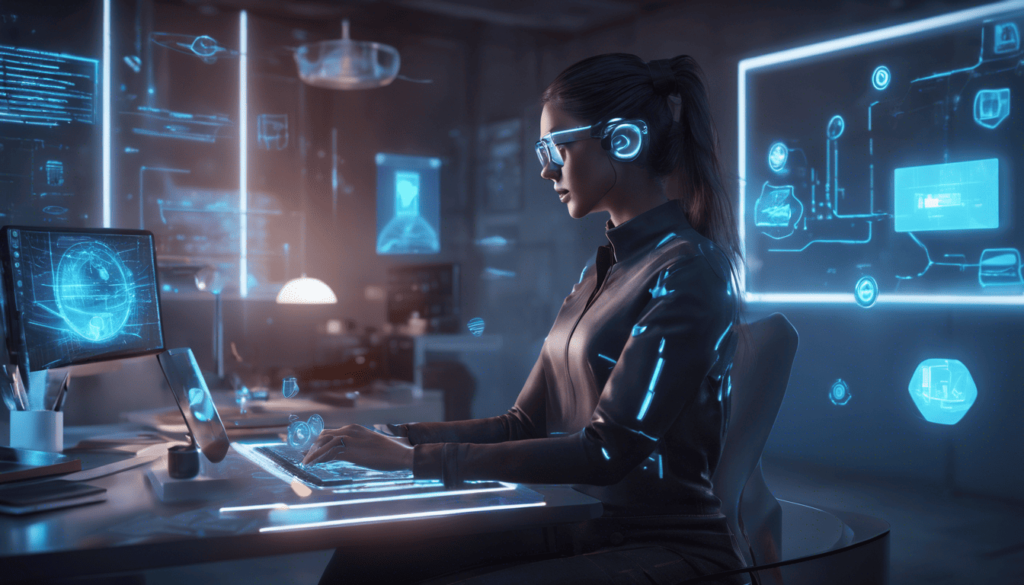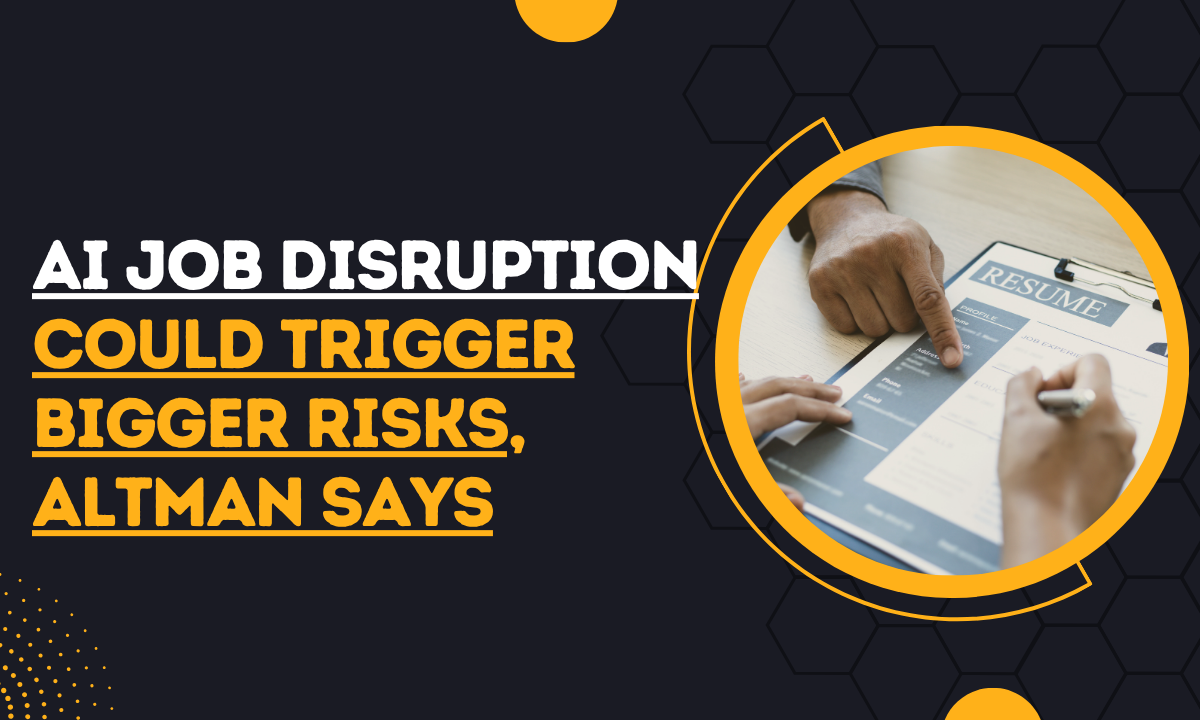AI Job Disruption Could Trigger Bigger Risks, Altman Says
It’s no longer a question of if AI job disruption will happen or not, or how soon, and what happens afterward. Sam Altman, the face of OpenAI, isn’t sugarcoating it anymore.
In boardrooms and before lawmakers, he’s delivering a dual message: AI job disruption is not just coming—it’s here.
But it’s not the endpoint.
What keeps him up at night isn’t customer service bots replacing workers. It’s the more chilling thought of AI being weaponized by foreign adversaries, fraudsters, or unchecked corporations.
We’re entering a world where job automation may be the least of our problems.
Altman paints a future where financial systems, national security, and even healthcare face radical transformation—with no clear safety rails.
As tech accelerates, so do the stakes. This isn’t just about tech reshaping work.
It’s about trust, control, and survival in a world being rewritten by code.
1. The Glamour and Gloom of AI Efficiency
In elite conferences and federal chambers, Altman confidently declares that AI can outperform human agents in customer support. “No phone trees, no mistakes,” he says.
Imagine calling your bank and having your problem solved instantly by a flawless, tireless virtual agent. It’s efficient and seamless.

Image Source: Interview Baba.com
It’s the end of frustration—and for many, the end of employment.
Entire job categories, Altman predicts, will vanish.
AI job disruption in industries like customer support isn’t a distant threat—it’s already happening.
But what’s striking isn’t just the precision of AI—it’s how comfortably it renders humans obsolete.
2. AI Job Disruption: The AI Doctor Debate
Altman doesn’t stop at call centers
. With a casual boldness, he drops another bomb: ChatGPT now performs better than most doctors at diagnosing illness.
That’s no small claim—it reframes the doctor-patient relationship and questions centuries of medical authority.
Yet in the same breath, he admits he wouldn’t trust AI with his own health without a human involved. It’s a curious contradiction.
The machine is superior, but still… he hesitates.
Why?
Because AI job disruption doesn’t just mean roles replaced—it means trust is displaced, and that’s a more fragile currency.
3. The Uncomfortable Truth About National Security
It’s not just jobs on the line—it’s sovereignty.
According to studies on national security, the race is on to leverage AI both to defend against emerging AI-driven threats and to deploy it as a strategic countermeasure to hostile actions.
Altman admits he lies awake at night imagining how a hostile nation could weaponize AI to hack or destabilize the U.S. economy.
While others debate policy frameworks, he’s already on the battlefield of hypotheticals, picturing systems brought to their knees with generative code and cloned voices.
Yes, AI job disruption is real—but so is digital warfare.
Altman’s point: if we don’t govern this tech wisely, it won’t just threaten paychecks. It could threaten peace.
4. The Voice You Hear Might Not Be Human
In a world already weary of misinformation, Altman adds another layer: deepfake voices.

Image Source: Vinodz.com
Financial institutions still using voice authentication could unknowingly allow fraudsters to break in using a perfectly cloned replica of your voice.
It’s one thing to lose your job. It’s another to lose your identity.
The AI revolution, he warns, is so advanced in replicating human sound that we may not know who we’re talking to anymore.
And in that confusion, AI job disruption morphs into existential disruption.
5. When Optimism Meets Control: The Washington Push
Altman’s Washington charm offensive is no accident.
OpenAI isn’t just a tech company anymore—it’s lobbying, expanding, and embedding itself into the political narrative.
While President Biden pushed for guardrails, the new administration is taking a more aggressive posture, prioritizing AI acceleration to beat geopolitical rivals like China.
Here’s the irony: in trying to “win” the AI race, we may outrun our own ability to control it.
And amid this race, AI job disruption becomes the politically acceptable collateral damage.
6. Human Judgment vs. Automation Hysteria
Not everyone is marching to Altman’s tune.
CTO Manoj Chaudhary sounds a note of caution—AI isn’t inherently destructive.
It’s the reckless rollout, the obsession with efficiency over empathy, that causes damage.
As companies automate without foresight, they risk losing the human insight that makes decisions wise, not just fast. AI job disruption, then, isn’t a prophecy—it’s a choice.
We’re deciding, right now, how much we value human nuance in a world seduced by speed.
7. Who Holds the Steering Wheel?
Altman’s presence in D.C. is strategic.
He’s not just testifying—he’s declaring OpenAI as the only navigator capable of balancing progress and catastrophe. He offers two futures: one of spectacular gains, and one of societal collapse.
And in both visions, OpenAI plays the central role.
But this positioning also raises a question: when one man, or one company, becomes the gatekeeper of such power, can we trust that gate won’t swing shut on us?
AI job disruption may be a symptom, but unchecked centralization might be the deeper disease.
AI Job Disruption: What’s Changing Now
| Where AI Is Already Changing Things | What Most People Still Overlook | What Could Collapse Next |
|---|---|---|
| AI is replacing customer service agents entirely | Many still assume AI is a future issue, not a present one | Our sense of who’s real may vanish with voice deepfakes |
| Diagnostic tools now outperform average doctors | Trust in AI doesn’t equal trustworthiness | Medical mistakes may increase if humans exit the loop |
| Smart assistants handle banking, travel, and HR | Empathy and human nuance aren’t part of the algorithm | Customer care could become cold, rigid, and dangerous |
| AI edits content, writes emails, and books meetings | People confuse speed with wisdom | Workplaces may lose original thinking and judgment |
| Hiring is now partially or fully AI-driven | Algorithmic bias often goes unnoticed | Fair hiring practices could quietly erode |
| Entry-level jobs are quietly disappearing | Job loss is framed as efficiency, not displacement | Economic inequality may widen rapidly |
| AI runs core systems in finance and logistics | Few question AI’s power over critical infrastructure | Systemic collapse could come from a single AI failure |
| Fraud detection is now machine-learned | Security protocols still trust outdated verification | Voice-cloning scams may drain financial institutions |
| Government uses AI for surveillance and strategy | Citizens are rarely informed about how AI tracks them | Civil liberties could dissolve without a fight |
FAQs
Q1: What exactly does “AI job disruption” mean?
It refers to jobs being automated or fundamentally changed by AI technologies, potentially leading to mass layoffs or job redefinitions.
Q2: Why is Sam Altman worried about AI if he builds it?
Altman recognizes AI’s immense potential for good—but also its risks if misused, including job losses, fraud, and even national security threats.
Q3: Is AI really replacing doctors?
Altman claims that AI like ChatGPT can outperform many doctors in diagnosis, but even he admits humans are still essential for real-world healthcare decisions.
Q4: How can AI be weaponized by other nations?
AI could be used for cyberattacks, financial system disruption, deepfake propaganda, or advanced surveillance—posing serious national threats.
Q5: What should companies do instead of rushing to automate?
They should focus on responsible, human-centered integration—where AI assists rather than replaces, and decisions are guided by empathy and judgment.
TL;DR – Key Takeaways
- AI job disruption is already eliminating entire sectors like customer support.
- Altman claims AI can outperform doctors, yet still wouldn’t trust it alone for his own care.
- Deepfake voice technology could make identity fraud nearly unstoppable.
- Foreign powers could exploit AI to destabilize national systems.
- The U.S. is accelerating AI growth to outpace China—potentially at the cost of oversight.
- Thought leaders warn that bad deployment—not AI itself—is the real threat.
Related posts
AI and Superintelligence: What It Means for the Future of Humanity
Discover how AI’s rapid evolution toward superintelligence could redefine human purpose, ethics, and survival.
Is AI Becoming Your AI Personal Assistant Future or Your Master?
AI Is Replacing You! 15 AI Jobs Non-Techies Must Grab Now
Quantum AI: The Future of Artificial Intelligence is Here!
Conclusion
Sam Altman isn’t ringing the alarm bell to scare us—he’s doing it to warn us that we’re sleepwalking toward a future shaped by forces we don’t yet fully understand.
AI job disruption may be the headline, but it’s just the surface layer of a deeper tectonic shift. Beneath the excitement of AI’s possibilities lies a more unsettling truth: our institutions, ethics, and readiness may not be evolving as fast as the technology they must govern.
Altman’s dual message—of progress and peril—reminds us that how we respond now will determine whether AI becomes our liberator or our undoing.
The future doesn’t have to be dystopian. But only if we remember that power without reflection is a recipe for collapse. And that the human judgment we rush to replace may be exactly what saves us.

